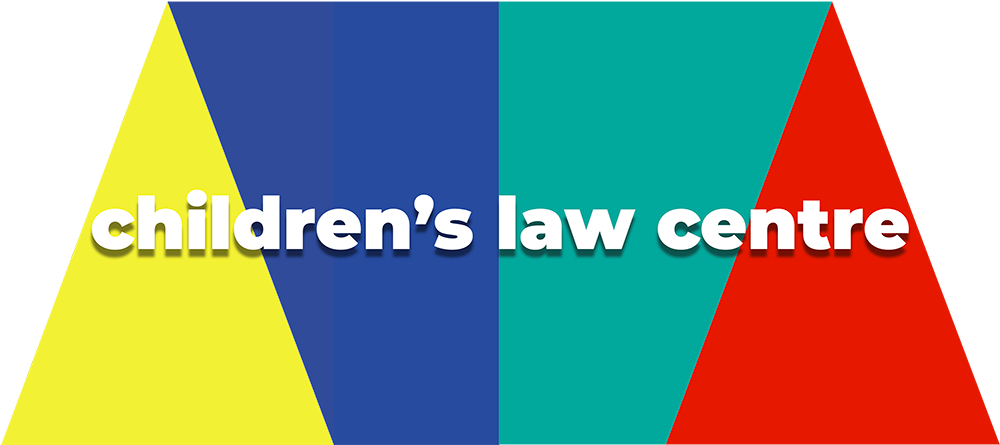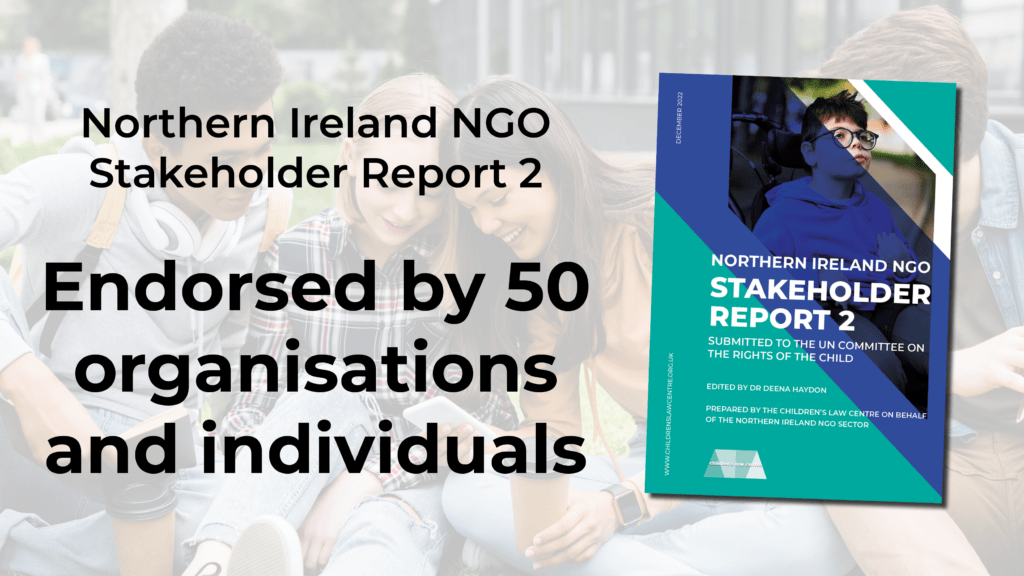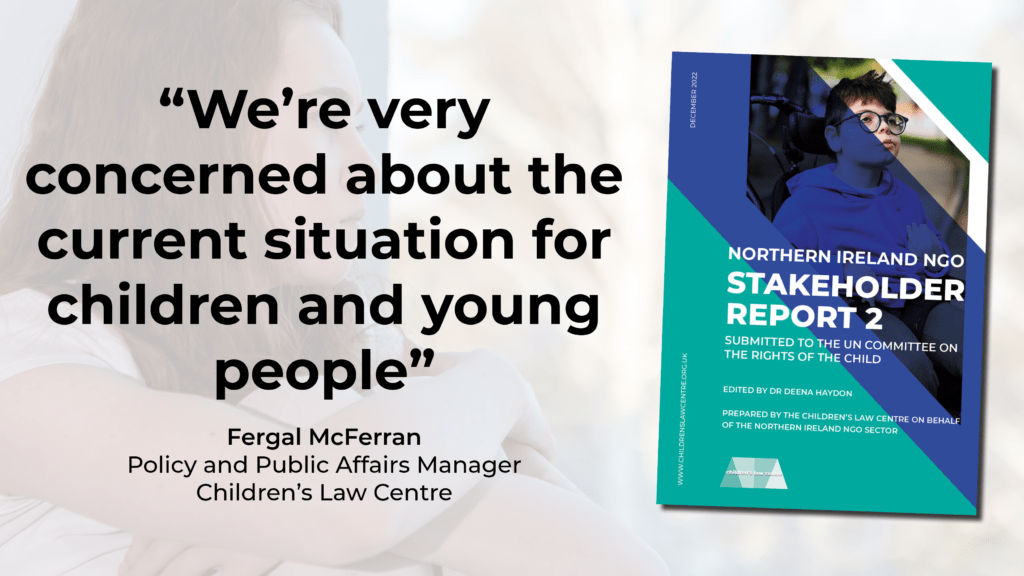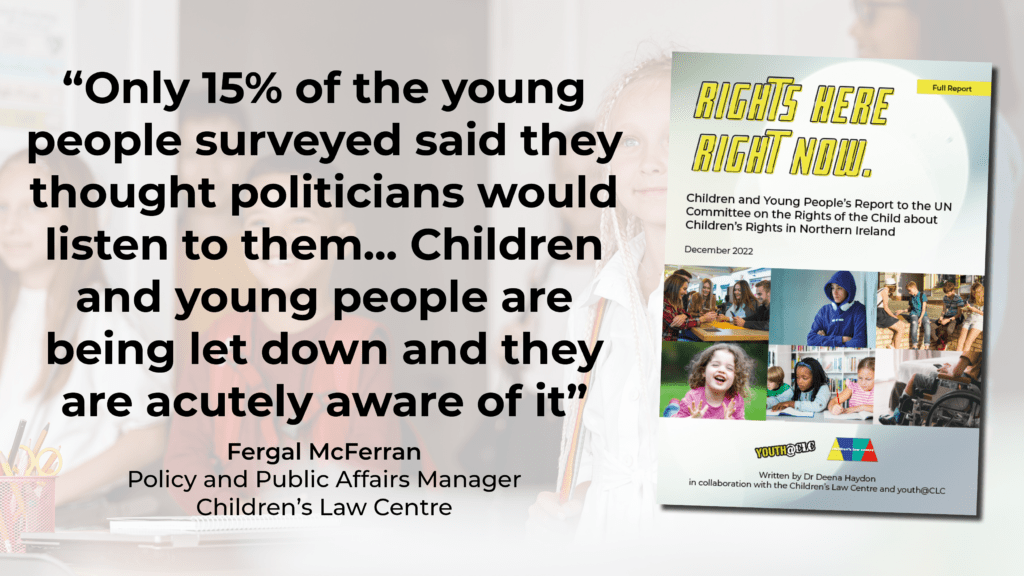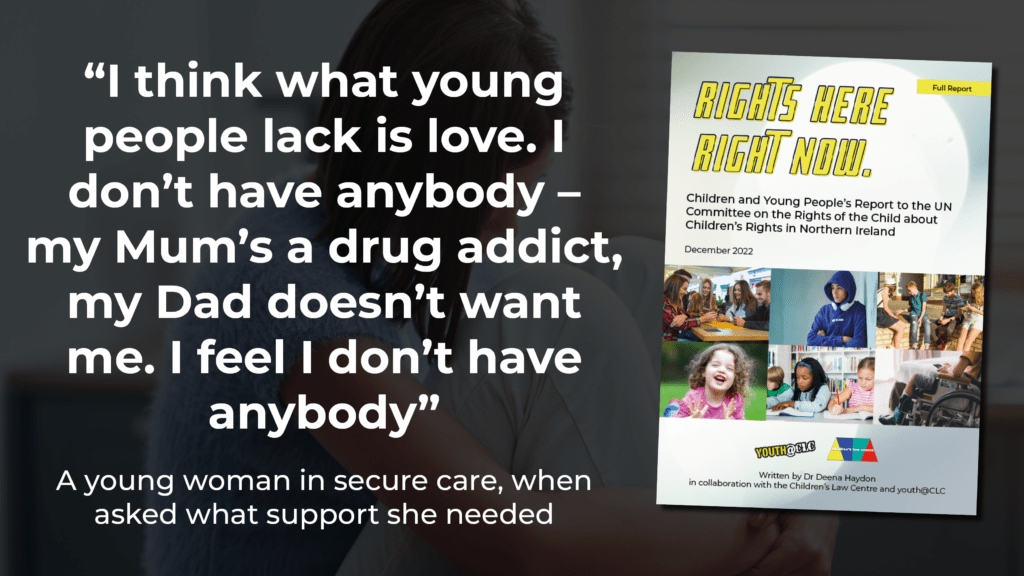Damning Reports Show How Regression in Rights is Harming Children
Thursday 19 January 2023
Children’s Law Centre submits three substantial reports to the UN Committee on the Rights of the Child demonstrating how rights and protections for children have regressed
NGO Stakeholder Report 2 endorsed by over 50 organisations and individuals
Rights Here, Right Now report informed by over one thousand children and young people, including workshops with 127 disadvantaged or vulnerable children
Three major reports, submitted to the UN Committee on the Rights of the Child, demonstrate a regression in children’s rights. The reports, submitted by the Children’s Law Centre in consultation with a wide range of NGOs, as well as over one thousand children, highlight significant gaps in children’s rights and the impact this is having on children and young people in Northern Ireland.
Download the Rights Here, Rights Now Children and Young People’s Report
Download the Rights Here, Right Now Summary for Children and Young People
Download the Northern Ireland NGO Stakeholder Report 2
Download the Northern Ireland NGO Stakeholder Report 2 Evidence
The number and complexity of the issues being reported to the UN Committee have grown since the previous examination of the UK Government in 2016. Previous recommendations made by the UN Committee, such as raising the age of criminal responsibility and removing the defence of reasonable punishment remain unaddressed. However, the number and complexity of issues facing children and young people has dramatically increased over the last number of years.
Speaking ahead of submitting the reports, Fergal McFerran, Policy and Public Affairs Manager at the Children’s Law Centre, said:
“We’re very concerned about the current situation for children and young people. These reports have been informed by a wide range of expertise within the NGO sector in Northern Ireland. They also give a voice to over one thousand children and young people here. We are able to give a very good indication of where we are in relation to children’s rights and the issues facing children, but I’m afraid it’s very concerning reading.
“A number of the major recommendations from previous concluding observations remain unimplemented. These include raising the age of criminal responsibility, removing the defence of reasonable punishment, the failure to enact a Bill of Rights for Northern Ireland, and the introduction of age discrimination legislation to protect children. These are all issues raised in 2016 which have still not been addressed.
“However, the subsequent years have become even more perilous for children and young people. Since 2016 we’ve had attacks on human rights from the UK Government, uncertainty around rights protected by the Good Friday Agreement, escalating pressures on public services, the impact of Covid policies on vulnerable children, and a growing failure to protect newcomer children.
“In addition, issues that did not feature in 2016 are now major concerns. These include the rising number of unaccompanied asylum-seeking children, as well as the growing numbers of newcomer children being held in unsuitable temporary accommodation. While concerns around the disproportionate numbers of children being stopped and searched remain, we now also have serious concerns around the strip searching of children and the use of ‘spit hoods’.”
Children and young people’s opinions
Speaking about some of the findings in the children and young people’s report, Fergal McFerran, continued:
“It’s little wonder that only 38% of young people surveyed by our youth panel said they could trust the police in their area. Only 15% of the young people surveyed said they thought politicians would listen to them if they gave their opinion. Children and young people are being let down and they are acutely aware of it.
“Our youth survey also highlighted the widening gap in children’s rights when it comes to more vulnerable groups. Disabled children and children on free school meals were much more likely to feel negatively about their experiences across a number of general topics, including being listened to, being able to take part in making decisions that affect their lives, avoiding discrimination and being able to thrive. Children were also significantly less confident about accessing appropriate help and support for their mental health needs than they were about their physical health needs.
“The survey responses indicate a keen desire from children and young people to learn more about rights. Of respondents, 76% said they had heard about children’s rights before doing the survey, but only 51% said they understood what children’s rights meant. 86% of respondents said children should learn about their rights, with 94% of them stating that school was the best place to learn about rights.”
Full implementation of the UN Convention on the Rights of the Child
Reflecting on what changes can be made to protect children and young people, Fergal McFerran concluded:
“We are certain that the best way to protect children and young people from the many challenges they face is to see full and swift incorporation of the UN Convention on the Rights of the Child into domestic law.
“We look forward to engaging further with the UN Committee on the Rights of the Child through the examination process, including leading a delegation of children and young people to Geneva in February. We hope to see a strong set of recommendations that ensure the UK Government and local decision makers fulfil their obligations in protecting children and young people here.”
What is the UNCRC examination process?
The UK Government signed up to the UNCRC in 1990 and it was ratified in 1991. By ratifying the UNCRC, the UK Government have a duty under international law to make sure the rights of all children and young people in Northern Ireland are protected, and to work towards making these rights a reality in law.
The UK Government must report to the UN Committee on the Rights of the Child every five years to explain how well they are protecting children’ rights in Northern Ireland. The Committee then make concluding observations and recommendations for the UK Government to implement.
The Children’s Law Centre leads the Northern Ireland voluntary sector in submitting evidence to inform the examination process. The Centre’s youth panel, youth@CLC, also submits a children and young people’s report. The Children’s Law Centre will bring a delegation of young people to Geneva to meet with the UN Committee in February 2023.
Thank you to everyone who contributed to the reports
The Children’s Law Centre was pleased to lead the sector once again in submitting the Northern Ireland NGO report to the UN Committee on the Rights of the Child. We would like to thank our youth panel, youth@CLC, for helping us develop and submit the Rights Here, Right Now survey and report. We would like to thank the 1,026 respondents to the survey, the 127 children and young people who took part in workshops and the NGOs that contributed to the Stakeholder Report 2 and associated Stakeholder Report 2 Evidence. Finally, we would like to thank Jerome Finnegan of Save the Children for his assistance in developing and analysing the survey and Dr Deena Haydon for her extensive work gathering, analysing and writing up the information presented in these reports.
